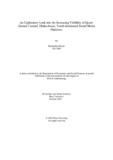| dc.contributor.advisor | Sabur, Dr. Seuty | |
| dc.contributor.author | Hassan, Mashaekh | |
| dc.date.accessioned | 2023-04-04T05:49:33Z | |
| dc.date.available | 2023-04-04T05:49:33Z | |
| dc.date.copyright | 2022 | |
| dc.date.issued | 2022-10 | |
| dc.identifier.other | ID: 19117001 | |
| dc.identifier.uri | http://hdl.handle.net/10361/18073 | |
| dc.description | This thesis is submitted in partial fulfillment of the requirements for the degree of Bachelor of Social Science in Anthropology, 2022. | en_US |
| dc.description | Cataloged from PDF version of thesis. | |
| dc.description | Includes bibliographical references (pages 47-48). | |
| dc.description.abstract | Given the taboo around sex and section 377, Bangladesh is not the safest country for the
LGBTQIA population and its ally. The murder of Xulhaz Mannan, a queer activist, or the
instances of ending up in jail for posting controversial content make it even clear that being
vocal about supporting LGBTQ rights can have various detrimental consequences. Despite
that, Bangladeshi virtual space is becoming heavy with queer-friendly content. Against this
backdrop, the study explores the factors contributing to the increasing visibility of queer themed content across Dhaka-based, youth-dominated social media platforms. I conducted
both primary and secondary research to look deeper into the phenomenon. I reviewed
academic journals, newspaper articles, and reports for secondary research and took
participant interviews for primary research. The qualitative analysis of my findings from
interviewing five interlocutors reveals that the people vocal about queer rights online belong
to an affluent social class with access to English education and the language. Secondly, they
feel more at ease being expressive online than offline. Thirdly, they are aware of the
uncertainties surrounding whether or not a discourse related to LGBTQ rights would be
efficient in the virtual sphere. Finally, they use English, customizable privacy settings on
social media platforms, and lie if needed to narrow down the chances of getting backlashes. | en_US |
| dc.description.statementofresponsibility | Mashaekh Hassan | |
| dc.format.extent | 50 pages | |
| dc.language.iso | en | en_US |
| dc.publisher | Brac University | en_US |
| dc.rights | Brac University theses are protected by copyright. They may be viewed from this source for any purpose, but reproduction or distribution in any format is prohibited without written permission. | |
| dc.subject | Bangladeshi LGBTQ Population | en_US |
| dc.subject | Queer | en_US |
| dc.subject | Social Media | en_US |
| dc.subject | Sex and Sexuality | en_US |
| dc.subject | Queer Visibility | en_US |
| dc.subject | LGBTQ Representation | en_US |
| dc.subject.lcsh | Gender identity in mass media. | |
| dc.title | An exploratory look into the increasing visibility of queer-themed content: Dhaka-based, youth-dominated social media platforms | en_US |
| dc.type | Thesis | en_US |
| dc.contributor.department | Department of Economics and Social Sciences, Brac University | |
| dc.description.degree | BSS in Anthropology | |

